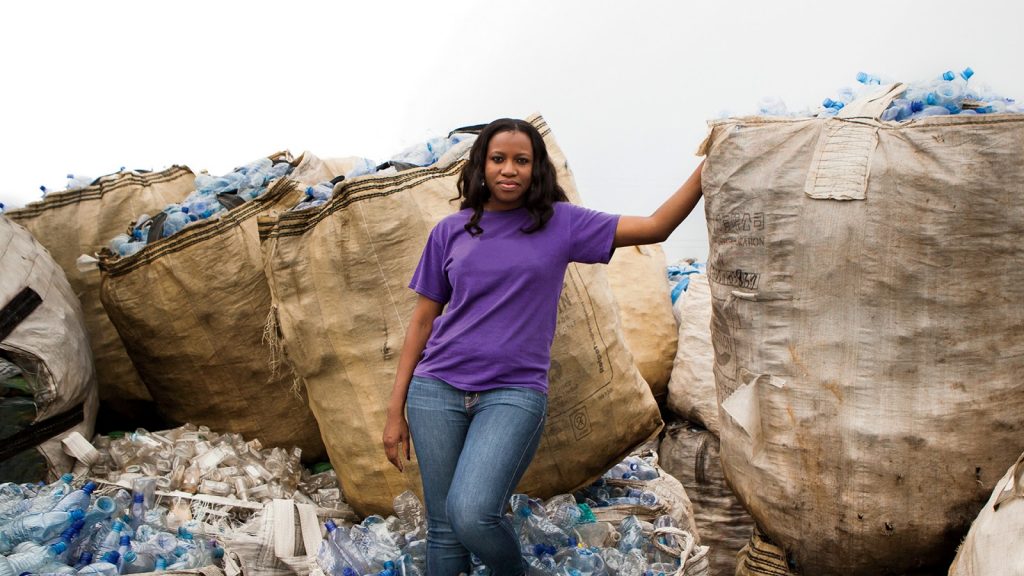In Lagos, Nigeria, the sights and smells of uncollected garbage are shocking. Piles of rubbish lie on streets, outside homes, around places of work and in areas where children play.
Waste fills drainage areas and waterways that lead to the Atlantic Ocean, creating breeding grounds for diseases such as malaria.
Cities across the world struggle with waste management. In Lagos, the situation is particularly dire — an estimated two-thirds of the population live in slums, many without access to reliable garbage collection, and recycling is minimal at best.
Now four-year-old startup Wecyclers is determined to make recycling a popular practice in Lagos by helping people to see garbage as a valuable resource.
Wecyclers runs on teamwork, using an incentive-based programme in the city’s low-income areas (where municipal services often don’t reach) and empowering residents to help solve Lagos’s waste problem.
It’s an “everyone wins” business model. A fleet of cyclists pedal custom-made cargo tricycles door to door every week, down narrow, unpaved streets where trucks can’t easily go, weighing and collecting recyclable waste from registered households. Members receive points for every kilogram of waste recycled, which they can exchange for goods.
“We help our subscribers save, using their waste for things they aspire to have. This could be a TV set, a sewing machine or even much-needed cash to fund a wedding,” says Wecyclers CEO and founder Bilikiss Adebiyi-Abiola.
Once Wecyclers collects the rubbish, the items are sorted, bagged and sold to recycling factories in Nigeria that use the material to make products such as pillow stuffing.
Lagos is Africa’s most populous metropolitan area, with an estimated 21-million people. It generates more than 10,000 tonnes of waste daily, according to the city’s waste management authority, creating health and environmental hazards in many communities. Only an estimated 40% of the city’s waste is collected and 13% is recycled.

Since 2012, Wecyclers has picked up 1,000 tonnes of household waste, signed up more than 11,000 households and created 103 jobs.
“The proof that Wecyclers is making a difference to me is the quantum of waste we collect daily,” says Adebiyi-Abiola. “Sometimes I stop and think about what would happen in those communities if we didn’t collect the waste.”
Born and raised in Lagos, Adebiyi-Abiola moved to the US at 17 to further her education. She came up with the concept for Wecyclers while pursuing an MBA at the Massachusetts Institute of Technology (MIT), in a class aimed at finding practical solutions to help the poorest people.
“In Nigeria, about 70% of the population lives at the base of the pyramid. This realisation awoke a new consciousness in me,” she says.
In the beginning, Wecyclers received support from various MIT programmes. Today the company gets funding and support from the Lagos State government, private companies such as DHL, Unilever and Oracle Corporation, and from foundations such as Small World Foundation.
Recently, Eric-Vincent Guichard of Gravitas Capital offered to issue a Diaspora bond for Wecyclers, partially backed by USAID.
Wecyclers has received international recognition, too.
It was a 2016 SXSW Eco Startup Showcase finalist, and at press time Adebiyi-Abiola was in the running for an All Africa Business Leader Award.
But the company still faces many challenges.
Adebiyi-Abiola says it has yet to make a profit, though it is close.
“Right now we bear the full cost of waste collection. We need the government to make policies that would encourage producers to take responsibility for their waste.”
Despite the obstacles, she is determined to expand operations and help change attitudes towards waste.
“I think we are on to something when I see the new consciousness in the eyes of the people we serve,” Adebiyi-Abiola says.
“They understand that waste has a value now and they are keen to collect income and improve their lives.”


